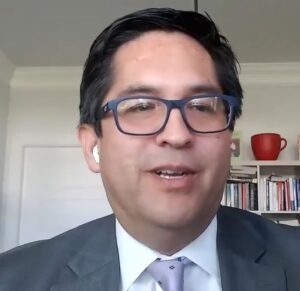
Alex Hernandez, dean of the School of Continuing and Professional Studies at the University of Virginia.
by James A. Bacon
Eight years ago the forced resignation of University of Virginia President Teresa Sullivan embroiled Virginia’s flagship university in a controversy that played out nationally. Rector Helen E. Dragas saw an “existential threat to the greatness of UVa” from demographic, financial and technological forces reshaping the higher-education landscape. The most controversial of these was the emergence of online learning. Sullivan, Dragas said, had not moved aggressively enough to incorporate online learning into UVa’s strategic planning. In the turmoil that followed, Sullivan carried the day. She was reinstated as president and remained until replaced by Jim Ryan in 2018.
But the challenge of online learning did not go away. While change has not come as rapidly as some predicted, online learning has steadily gained higher-ed market share in the years since. Following Sullivan’s philosophy of incremental change, UVa remained committed to the traditional model of classroom teaching but experimented with online learning on the margins. Then, boom, along came the COVID-19 epidemic. Suddenly, every university in the country, including UVa, was compelled to convert in-person classes to an online format.
COVID has shifted the conversation dramatically.
“Today every student is learning online. Every faculty member is teaching online. Every parent has an online student.” Alex Hernandez, dean of the School of Continuing and Professional Studies (SCPS), told the Board of Visitors at its December meeting a week ago. “In a post-COVID-19 world,” he asked, “can we just go back to normal?”
The pandemic has accelerated trends that were already in motion, Hernandez said. Employers are building their own offerings, conferring certificates that demonstrate competency in specific technology skills. Top-tier universities are building portfolios of online programs from short courses to boot camps, from certificates to degrees.
“We’ve learned that students learn in different ways,” Hernandez said. “Three in ten prefer online only. Three in ten prefer a mix.” Online learning has been criticized for the difficulty participants have in forming relationships, but experience has shown that it is possible to structure digital classrooms that allow relationships to develop.
As Hernandez views the evolution of online learning, he sees an opportunity for UVa to take the lead. People are getting technical training online, but they find it harder to get the human skills. Employers want students with both. UVa can distinguish itself by bringing human skills and digital skills together, in effect combining technology and liberal arts.
Although Hernandez did not describe it this way, UVa’s pre-COVID progress toward online learning has been halting and tentative, marked by faculty resistance to change.
The school of continuing studies has moved most aggressively to online formats, but it serves students who are not part of the UVa residential experience. Incremental progress has been achieved on “the grounds,” as the university refers to its campus. Since 2017, the School of Education has added 7 online graduate degrees, increasing online enrollment by 200%. Also, the new Data Science program offers an online MS program online to 170 students. The COVID-19 epidemic marked a watershed. Most faculty members, few of whom had any experience with online classes, took crash courses on how to convert their classes to online formats this fall.
In his personal demeanor, Hernandez hardly comes across as a fire-breathing radical, but he called for what amounts to disruptive change. UVa, he said, should recruit top firms and government agencies in Northern Virginia to build “a new learning model” that integrates work-based learning, career development, and liberal arts skills. Along those lines, the university should build a “digital campus” to reskill and upskill workers in the commonwealth.
What is a digital campus, a board member asked. It’s a domain where students can do more than just access courses, he said. They can interact digitally. They can build relationships and online communities.
Hernandez said he preferred a bottom-up approach to implementing digital learning. He sees valuable experimentation occurring within individual schools. “Once we get some wins on the board, we can invest in ways to make the entire university better.” In response to board questions, he did suggest, however, that UVa’s schools might benefit from “common infrastructure” such as digital marketing and enrollment.
“We were dragged into this kicking and screaming, but it has been remarkably rewarding,” said board member Ellen Bassett, who is a faculty member in the School of Architecture. Faculty members are “very interested in this” but “a little skeptical.”
“When I joined the board, faculty were adamant they would never go to online learning,” said board member Thomas DePasquale. He raised the concern that UVa not repeat mistakes of “rich schools” that could that bought a single system and got stuck with it as developed better systems.
Rector James Murray liked the idea of supplementing liberal arts degrees with technology skills certificates. “How do we let employers know we are doing this? We started talking about this when Teresa Sullivan was president. We’re doing it in increments. But does anybody know about it?”
This article is republished with permission from Bacon’s Rebellion.
